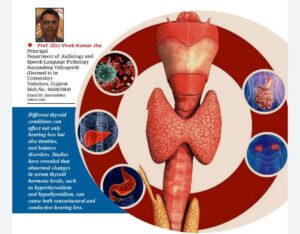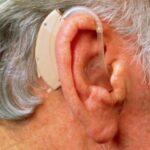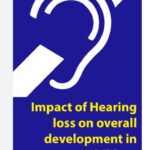Hypothyroidism and other different thyroid conditions can affect not only hearing loss but also tinnitus, and balance disorders. Studies have revealed that abnormal changes in serum thyroid hormone levels, such as hyperthyroidism and hypothyroidism, can cause both sensorineural and conductive hearing loss.


The importance of treating hearing loss is to understand how entire body and all its symptoms are linked together. If we are not able to exercise regularly this can affect so many aspects of our physical and mental health. Much is the same for hearing loss. Understanding the connections and educating ourself on the ailments can help us to prevent a hearing loss and so much more. Both hypothyroidism and hyperthyroidism can cause hearing loss, and different thyroid conditions can affect not only hearing loss but also tinnitus, and balance disorders.
The two most common problems in thyroid dysfunction are hormone overproduction (hyperthyroidism) and hormone underproduction (hypothyroidism).
Hyperthyroidism is rare, affecting about 1% of the population. It results in the quickening of metabolic processes. Symptoms include nervousness, irritability, weight loss, shaky hands, panic disorder, racing heart and tinnitus. The most common cause of hyperthyroidism is Graves’ disease, an autoimmune response that over-stimulates the thyroid. The tinnitus caused by hyperthyroidism is usually associated with heart rate.
Hypothyroidism, also called under active thyroid disease, is a common disorder. With hypothyroidism, our thyroid gland does not make enough thyroid hormone. The thyroid gland is located in the front lower part of the neck. Hormones released by the gland travel through our bloodstream and affect nearly every part of our body, from our heart and brain, to our muscles and skin.
Also Read: Hypothyroidism- commonest problem faced by women!
The thyroid controls how our body’s cells use energy from food, a process called metabolism. Among other things, our metabolism affects our body’s temperature, our heartbeat, and how well we burn calories. If a person doesn’t have enough thyroid hormone, his/her body processes slow down. That means his body makes less energy, and our metabolism becomes sluggish.
Fibromyalgia and Chronic Fatigue Syndrome (CFS) are conditions frequently associated with hypothyroidism. Studies suggest that up to 15% of people diagnosed with thyroid problems will end up with fibromyalgia.
Relation between hearing Loss and hypothyroidism
Hypothyroidism is the result of the thyroid not producing enough of the hormone thyroxine. This can cause depression, fatigue, forgetfulness, and weight gain. Thyroxine is also needed for normal development of the auditory system. In fact, about half of the people with low thyroid function have hearing losses.
The Journal of Clinical Endocrinology & Metabolism published a study linking hearing loss and hypothyroidism. The research study looked at how untreated hypothyroidism is known to impair hearing. The study found :
Patients were 3 times more likely to self-declare hearing loss than that for the reference population.
17% of affected patients required hearing support in early adulthood. Hearing loss was associated with the type of congenital hypothyroidism with disease severity. Hearing loss was mostly bilateral (90%), mild to moderate (96%), of the sensorineural type (76%), and compromised higher frequencies.
Treatment
Standard treatment for hypothyroidism involves daily use of the synthetic thyroid hormone levothyroxine (Levo-T, Synthroid, others). This oral medication restores adequate hormone levels, reversing the signs and symptoms of hypothyroidism. We will likely start to feel better soon after you start treatment. The medication gradually lowers cholesterol levels elevated by the disease and may reverse any weight gain. Treatment with levothyroxine will likely be life long, but because the dosage you need may change, our doctor is likely to check our TSH level every year.
Hearing test
Hearing loss is typically not one of the first symptoms for either hypothyroidism or hyperthyroidism. It is therefore possible to diagnose and treat thyroid issues before they impact your hearing. Common symptoms for hypothyroidism can include depression, fatigue, forgetfulness, and weight gain. Symptoms of hyperthyroidism include irritability, nervousness, muscle weakness, unexplained weight loss, sleep disturbances, vision problems, and eye irritation.
Our hearing and health are connected in more ways that we realize. Identifying changes to our hearing may help to identify other issues that we are unaware of. This is why we at Hearing Consultants cannot stress enough, the importance of annual hearing check-ups to ensure that our valuable hearing doesn’t slip away. The sooner you catch a hearing loss the sooner we can help you get back on track and maintain the hearing we still have.
Conclusion: Studies have revealed that abnormal changes in serum thyroid hormone levels, such as hyperthyroidism and hypothyroidism, can cause both sensorineural and conductive hearing loss. Both hypothyroidism and hyperthyroidism can cause hearing loss, and different thyroid conditions can affect not only hearing loss, but also tinnitus, and balance too. Hearing loss in hypothyroidism was found remediable and even reversible after proper replacement therapy. In a study by Di Lorenzo et al. a significant improvement in the hearing condition was reported in hypothyroid patients, after 6–12 months of L- thyroxine replacement therapy.


Prof. (Dr) Vivek Kumar Jha
Principal
Department of Audiology and Speech Language Pathology
Sumandeep Vidyapeeth (Deemed to be University)
Vadodara, Gujarat
Mob.No : 95602 76840
Email ID: jhavivek98@yahoo.com











